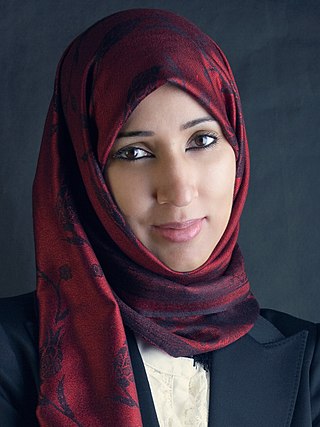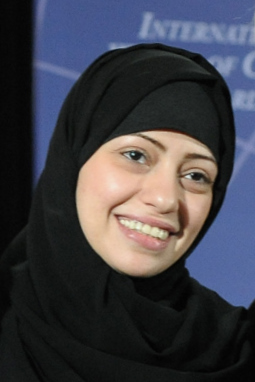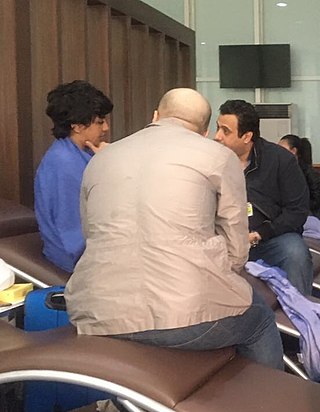Related Research Articles

Human rights in Saudi Arabia are a topic of concern and controversy. The Saudi government, which mandates both Muslim and non-Muslim observance of Islamic law under the absolute rule of the House of Saud, has been accused of and denounced by various international organizations and governments for violating human rights within the country. The authoritarian regime ruling the Kingdom of Saudi Arabia is consistently ranked among the "worst of the worst" in Freedom House's annual survey of political and civil rights.
Hanadi Zakaria al-Hindi is the first Saudi woman to become a pilot. She was born in Mecca in September 1978. She passed her final exams at the Middle East Academy for Commercial Aviation in Amman, Jordan on 15 June 2005. She has a ten-year contract with Prince Al-Waleed bin Talal’s Kingdom Holding Company as a pilot of his private jet, the Kingdom. Al-Waleed is considered a proponent for female emancipation in the Saudi world, financed her training and stated on her graduation that he is "in full support of Saudi ladies working in all fields". Al-Hindi became certified to fly within Saudi Arabia in 2014.
Capital punishment in Saudi Arabia is a legal penalty. Death sentences are almost exclusively based on the system of judicial sentencing discretion (tazir), following the classical principle of avoiding Sharia-prescribed (hudud) penalties when possible. In recent decades, the government and the courts have increasingly issued these sentences, reacting to a rise in violent crime during the 1970s. This paralleled similar developments in the U.S. and Mainland China in the late 20th century.

Women's rights in Saudi Arabia are a topic of concern and controversy internationally. Saudi women have experienced major legal rights reforms since 2017, after facing Wahhabism religious fundamentalist dominance dating from 1979.

Osama Hawsawi is a former Saudi Arabian footballer who played as a central defender.
Wajeha al-Huwaider is a Saudi activist and writer, who played key roles in the anti male-guardianship and women to drive campaigns during the early twenty-first century. She is a co-founder of The Association for the Protection and Defense of Women's Rights in Saudi Arabia. As a result of her work, al-Huwaider has been the recipient of both significant legal prosecution in Saudi Arabia and international praise.

Nawal Elsaadawi was an Egyptian feminist writer, activist and physician. She wrote numerous books on the subject of women in Islam, focusing on the practice of female genital mutilation in her society. She was described as "the Simone de Beauvoir of the Arab World", and as "Egypt's most radical woman".

Manal al-Sharif is a Saudi women's rights activist who helped start a right to drive campaign in 2011. Wajeha al-Huwaider filmed al-Sharif driving a car as part of the campaign. The video was posted on YouTube and Facebook. Al-Sharif was detained on 21 May 2011, released, and then rearrested the following day. On 30 May, al-Sharif was released on bail, on the conditions of returning for questioning if requested, not driving, and not talking to the media. The New York Times and Associated Press associated the women's driving campaign as part of the Arab Spring and the long duration of al-Sharif's detention due to Saudi authorities' fear of protests.

Until June 2018, Saudi Arabia was the only country in the world in which women were forbidden from driving motor vehicles. The Women to Drive Movement was a campaign by Saudi women, whom the government denies many rights to which men are entitled, for the right to drive motor vehicles on public roads. Dozens of women drove in Riyadh in 1990 and were arrested and had their passports confiscated. In 2007, Wajeha al-Huwaider and other women petitioned King Abdullah for the right to drive, and a film of al-Huwaider driving on International Women's Day 2008 attracted international media attention.

Samar bint Muhammad Badawi is a Saudi Arabian human rights activist. She and her father filed court cases against each other. Badawi's father accused her of disobedience under the Saudi Arabian male guardianship system and she charged her father with adhl—"making it hard or impossible for a person, especially a woman, to have what she wants, or what's rightfully hers; e.g, her right to marry" according to Islamic jurisprudence—for refusing to allow her to marry. After Badawi missed several trial dates relating to the charge, an arrest warrant was issued for her, and Badawi was imprisoned on 4 April 2010. In July 2010, Jeddah General Court ruled in Samar Badawi's favor, and she was released on 25 October 2010, and her guardianship was transferred to an uncle. There had been a local and international support campaign for her release. The Saudi NGO Human Rights First Society described Badawi's imprisonment as "outrageous illegal detention".

Sarah Attar is a Saudi-American track and field athlete who competed at the 2012 Summer Olympics as one of the first two female Olympians representing Saudi Arabia. She also competed in the marathon at the 2016 Olympics.

Women played a variety of roles in the Arab Spring, but its impact on women and their rights is unclear. The Arab Spring was a series of demonstrations, protests, and civil wars against authoritarian regimes that started in Tunisia and spread to much of the Arab world. The leaders of Tunisia, Egypt, Libya, and Yemen were overthrown; Bahrain has experienced sustained civil disorder, and the protests in Syria have become a civil war. Other Arab countries experienced protests as well.
Saudi Arabia has implemented its anti-domestic violence law in 2014. It is thought that in Saudi Arabia it is socially acceptable to hit women or children to discipline them, and while the older generations do hit children and some of them may hit women, the younger generations are generally growing out of the habit of hitting children and women as it is considered taboo, unethical, and inhuman.

Loujain al-Hathloul is a Saudi women's rights activist, a social media figure, and political prisoner. She is a graduate of the University of British Columbia. Al-Hathloul has been arrested and released on several occasions for defying the ban on women driving in Saudi Arabia and was arrested in May 2018, with several prominent women's rights activists, on the charge of "attempting to destabilise the kingdom" after being effectively kidnapped in the United Arab Emirates (UAE). As of October 2018, her husband, Saudi stand-up comedian Fahad al-Butairi, had also been forcibly returned from Jordan to the Kingdom and was under arrest.
Nawal or Nawaal is Arabic female given name literally meaning "unmerited favour of God" or "gift, grant, present, donation, award, offering" or also could mean "state or quality of being kind, act of kindness beyond what is due" or "grace, kindness, favour, charity". The name is actually an infinitive form of the adjective which stems from verb نَالَ nāla, meaning "to accomplish, achieve, earn, gain, receive".

Dina Ali Lasloom is a Saudi woman who attempted to seek asylum in Australia to escape Saudi guardianship laws, but was forcibly repatriated to Saudi Arabia from the Philippines. She was stopped in transit at Ninoy Aquino International Airport in Manila on 10 April 2017 and sent back to Saudi Arabia on 11 April 2017.
Rahaf Mohammed is a Saudi refugee and author who was detained by Thai authorities on 5 January 2019 while transiting through Bangkok airport, en route from Kuwait to Australia.

Sameera Aziz is a Saudi media personality, social worker, radio host, and businesswoman. She is a Jeddah-based Saudi national. Her companies are Sameera Aziz Group and Sameera Aziz Entertainment, the latter of which was the first Saudi production house in India. Aziz is the first Saudi female director in Bollywood. Her events company holds a Guinness World Record for making world's largest human-picture mosaic in 2017.
Feminism in Saudi Arabia dates back to the ancient, pre-Roman Nabataean Kingdom in which women were independent legal persons. Twenty-first century feminist movements in Saudi Arabia include the women to drive movement and the anti male-guardianship campaign. Madawi al-Rasheed argued in 2019 that the Saudi feminist movement was "the most organised and articulate civil society" in Saudi Arabia.

Reema Juffali, also spelt either as Reema Al Juffali or Reema Al-Juffali, is a Saudi Arabian professional racing car driver who competes in the International GT Open with her own team, Theeba Motorsport. She is the first-ever Saudi Arabian woman racing driver, the first Saudi woman to hold a racing license and also the first Saudi woman to win an international motor race. In November 2019, she became the country's first woman racing car driver to take part in an international racing competition in the Kingdom of Saudi Arabia.
References
- ↑ "The 'Rosa Parks' of Saudi Arabia". BBC News. 2016. Retrieved 2018-11-26.
- ↑ "'I admit I fell apart in front of Andrew Neil, but I'm right about radicalisation'" . The Independent. Archived from the original on 2022-06-18. Retrieved 2018-11-26.
- ↑ Staff Writer. (2016). The 'Rosa Parks' of Saudi Arabia. BBC. https://www.bbc.com/news/blogs-trending- 35263100
- ↑ "Saudi Arabia's 'Rosa Parks' faces torrent of abuse over Twitter". Women in the World in Association with The New York Times - WITW. 2016-01-12. Retrieved 2017-10-03.